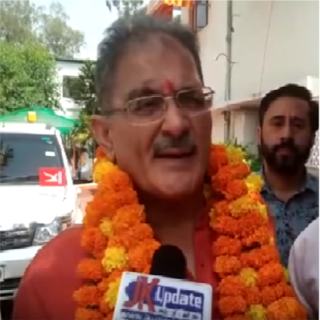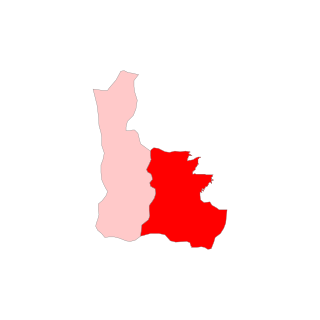
Article 370 of the Indian constitution gave special status to Jammu and Kashmir, a region located in the northern part of the Indian subcontinent and part of the larger region of Kashmir which has been the subject of a dispute between India, Pakistan and China since 1947. Jammu and Kashmir was administered by India as a state from 17 November 1952 to 31 October 2019, and Article 370 conferred on it the power to have a separate constitution, a state flag, and autonomy of internal administration.
Balraj Madhok was an Indian political activist and politician from Jammu. Originally an activist of the nationalist organisation Rashtriya Swayamsevak Sangh (RSS), he later worked as a politician in the Bharatiya Jan Sangh (BJS).
Prem Nath Dogra, also known as Pandit Prem Nath Dogra, was a leader from Jammu and Kashmir who worked for total integration of the state with India. He is commonly referred to as Sher e Duggar. He was instrumental in forming the Jammu Praja Parishad party in 1947 along with Balraj Madhok and opposed the policies of Sheikh Abdullah. He was later elected the president of Bharatiya Jana Sangh in 1955 for a brief period. He dedicated himself to the service of downtrodden poor and proletariat part of society.

Jammu and Kashmir is administered by the Republic of India within the framework of a federal parliamentary republic as a union territory, like the union territory of Puducherry, with a multi-party democratic system of governance. Until 2019, it was governed as a state administered by India. Politics in the region reflects the historical tension and dispute that the state has been a part of in the form of the Kashmir conflict. The head of state is the Lieutenant Governor of Jammu and Kashmir, currently Manoj Sinha, while the head of government is the Chief Minister of Jammu and Kashmir, currently vacant. Legislative power is vested in the Legislative Assembly of Jammu and Kashmir, although this was dissolved by the Governor on 21 November 2018. The judiciary is independent of the executive and the legislature.
Elections were held in March 1952 for the Bihar Legislative Assembly. There were 276 constituencies with 50 of them being two-member constituencies. The Indian National Congress (INC) stormed into power. Shri Krishna Singh became the first elected Chief Minister of Bihar and Dr. Anugrah Narayan Sinha became the first Deputy Chief Minister cum Finance Minister of the state.

Elections in the Union Territory of Jammu and Kashmir are conducted in accordance with the Constitution of India to elect the representatives of various bodies at national, state and district levels including the 114 seat unicameral Jammu and Kashmir Legislative Assembly and the Parliament of India. The first elections in the Union Territory of Jammu and Kashmir took place between 28 November and 19 December 2020 in the form of by-elections to District Development Councils and municipal and panchayat level bodies. A fresh delimitation process for assembly constituencies began in February–March 2020.
The Harijan Mandal was an Ambedkarite political party in Jammu and Kashmir. The party was founded in 1951. It was modelled on the Scheduled Castes Federation. Unlike its predecessor, the All Jammu and Kashmir Harijan Mandal, this organization was oriented towards electoral politics. It was led by Babu Milkhi Ram (president), Munshi Ram, Major Singh and Sain Das. The party was concentrated in Jammu. It was opposed to the Jammu Praja Parishad, which was dominated by upper caste Hindus. The party received government support during the reign of Bakshi Ghulam Mohammad.
Elections for the Indian state of Jammu and Kashmir were held over June 1977, which are generally regarded as the first 'free and fair' elections in the state. Jammu & Kashmir National Conference, newly revived from the former Plebiscite Front, won an overwhelming majority and re-elected Sheikh Abdullah as the Chief Minister.

Kavinder Gupta is an Indian politician from the union territory of Jammu and Kashmir. He is the last Deputy Chief Minister of Jammu and Kashmir state.
The Jammu Praja Parishad was a political party active in the Jammu Division of the Indian-administered Jammu and Kashmir. It was founded in November 1947 by the Rashtriya Swayamsevak Sangh activist Balraj Madhok, and served as the main opposition party in the state. It maintained close ties with Bharatiya Jana Sangh during its lifetime and merged with the latter in 1963. Its main activity was to campaign for the close integration of Jammu and Kashmir with India and oppose the special status granted to the state under the Article 370 of the Indian constitution. After its merger with the Bharatiya Jana Sangh, the precursor of the present day Bharatiya Janata Party, the party gradually rose in stature. As an integral part of the Bharatiya Janata Party, it was a partner in the ruling coalition led by the People's Democratic Party.

Patacharkuchi Assembly constituency is one of the 126 assembly constituencies of Assam Legislative Assembly in India. Patacharkuchi forms part of the Barpeta Lok Sabha constituency.
Elections for the Indian state of Jammu and Kashmir were held in February 1967. Ghulam Mohammed Sadiq was appointed Chief Minister of Jammu and Kashmir.
Elections for the Indian state of Jammu and Kashmir were held in the early months of 1962. Bakshi Ghulam Mohammad was appointed Prime Minister of Jammu and Kashmir.
The first elections for the Legislative Assembly of the Indian state of Jammu and Kashmir under its own Constitution were held in March–June 1957. Bakshi Ghulam Mohammad was appointed Prime Minister of Jammu and Kashmir.
Praja Parishad may refer to:
Elections for the Constituent Assembly of the Indian state of Jammu and Kashmir were held in September–October 1951. Sheikh Abdullah was appointed Prime Minister of Jammu and Kashmir. Following frictions with various groups such as the Jammu Praja Parishad agitation, Abdullah was dismissed in August 1953 and imprisoned. Bakshi Ghulam Mohammad was appointed as the next prime minister.
Hiranagar Assembly constituency is one of the 87 constituencies in the Jammu and Kashmir Legislative Assembly of Jammu and Kashmir a north Indian union territory. Hiranagar is also part of Jammu Lok Sabha constituency.
Reasi Assembly constituency is one of the 87 constituencies in the Jammu and Kashmir Legislative Assembly of Jammu and Kashmir a north state of India. Reasi is also part of Udhampur Lok Sabha constituency.

The Jammu and Kashmir Apni Party (JKAP) is a political party in Jammu and Kashmir, India, founded by Altaf Bukhari in March 2020. It has unofficial relations with Bharatiya Janata Party and is seen as sympathetic to the BJP administration.





